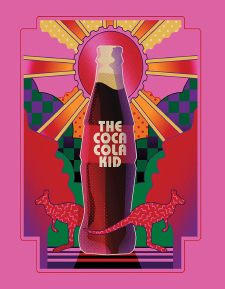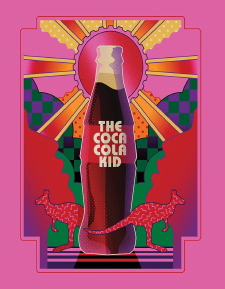Coca-Cola Kid, The (Blu-ray Review)

Director
Dusan MakavejevRelease Date(s)
1985 (June 28, 2022)Studio(s)
Cinecom International/Film Gallery (Fun City Editions/Vinegar Syndrome)- Film/Program Grade: B
- Video Grade: A-
- Audio Grade: B+
- Extras Grade: B+
Review
The Coca-Cola Kid was a genuinely strange brew in 1985. It was directed by maverick Yugoslavian filmmaker Dusan Makavejev, featuring equally maverick American actor Eric Roberts, based on stories by Australian author Frank Moorhouse, with all of that tied together by an improbably unauthorized appearance by Coca-Cola and all of its trademarks. The film was produced without the participation of the Coca-Cola Company, for obvious reasons, but to their credit, they didn’t take any legal action against it. To cover itself, rather than using the typical disclaimer at the end of the credits, The Coca-Cola Kid put its own disclaimer right up front, cheekily using that trademarked logo as many times as possible, while still acknowledging that it was a trademark. Surprisingly, Coke let all of that go.
The screenplay for The Coca-Cola Kid was by Moorhouse, based on his short stories from The Americans, Baby and The Electrical Experience. (Watch for an in-joke with Roberts reading a copy of the former.) Becker (Roberts) is a young Coca-Cola executive who’s been sent to the Australian division to shake things up in his own unique way, and to help their sales grow. He immediately comes into conflict with Terri (Greta Scacchi), a secretary who has been assigned to be his assistant, and then into an even bigger conflict with T. George McDowell (Bill Kerr), the owner of a regional soft drink company who refuses to allow competitors into his territory. Becker does his best to find a way to work around T. George, but when an irresistible force meets an immovable object, something has to give.
The Coca-Cola Kid is a study of culture clashes, on both sides of the camera: American vs. Australian vs. Yugoslavian; international corporations vs. family-owned regional businesses; modern technology vs. old-school methodology; and independent filmmaking vs. classical Hollywood form. The latter is particularly interesting, because despite the satirical elements on display, The Coca-Cola Kid is essentially a screwball comedy (albeit one with slightly less frenetic rhythms). Terri verges on being a manic pixie dream girl at times, but she’s still the catalyst that drives Becker’s journey, and she’s been given a wee bit more depth here than the trope usually provides. Scacchi is as fetching as ever, and she’s counterbalanced well by Roberts, who was doing Matthew McConaughey years before McConaughey did McConaughey. Kerr makes a great foil for both, but it’s child actor Rebecca Smart who steals every scene as Scacchi’s daughter DMZ. She’s one of the few people in the film who can handily put Roberts in his place.
The Coca-Cola Kid carries a vaguely anti-capitalist theme, yet it tends to get a bit lost with the occasionally slapstick antics on display. Becker ultimately changes his own value system, but the film doesn’t let things go that easily, and it ends with the following title card:
“A week later… While cherries blossomed in Japan, the next world war began.”
Make of that what you will.
Cinematographer Dean Semler shot The Coca-Cola Kid on 35 mm film using Panavision Panaflex cameras with spherical lenses, framed at 1.85 for its theatrical release. Fun City Editions describes the transfer as featuring a “new 2K restoration from its 35 mm interpositive.” The grain is quite heavy, especially when viewed in projection. The image is detailed, within the limitations of that grain structure, and there’s no significant damage to report. The contrast range is strong, though there’s missing detail in the darkest areas of the screen. The colors look natural, with the distinctive Coca-Cola red appearing quite vivid, and the flesh tones seem accurate. The only real issue is that grain, and while this might sound heretical, this is one case where perhaps a judiciously delicate touch of DNR wouldn't have hurt—the grain on release prints would have been a bit softer than this. Your mileage may vary, however, depending on the size of your display.
Audio is offered in English 2.0 LPCM, with optional English subtitles. The Coca-Cola Kid was released theatrically in Dolby Stereo, so this is a four-channel mix matrixed into two. The surrounds are fairly active, filled with the sounds of airplanes, helicopters, wildlife, factory noises, and more. The dialogue is clear, and there’s actual heft to the score by William Motzing and the songs by Tim Finn, with a decent amount of low-end extension as well. (Fair warning: Finn’s Australian Coke jingle can be something of an earworm.) This is a fine example of an Eighties surround mix, and it proves that even a screwball comedy can benefit from immersive sound design.
The Fun City Editions Blu-ray release of The Coca-Cola Kid includes a reversible insert with new artwork on one side, and the original theatrical artwork on the reverse, as well as a 12-page booklet with an essay by Spike Carter. There’s also an embossed and spot gloss slipcover available directly from Vinegar Syndrome, limited to the first 3,000 units, designed by We Bury Your Kids. The following extras are included:
- Audio Commentary by Lars Nilsen and Jonathan Hertzberg
- Dark and Bubbly (HD – 11:07)
- The Real Thing (Upscaled HD – 32:16)
- Theatrical Trailer (Upscaled HD – 2:36)
- Image Gallery (HD – :37)
The commentary track features Lars Nilsen, who is a film programmer for the Austin Film Society, and Jonathan Hertzberg from Fun City Editions. (There are also a few cameo recordings near the end featuring former Cinecom Pictures executive Ira Deutschman talking about their distribution of the film, as well as its critical reception.) They discuss the contributions from Moorhouse, Makavejev, Roberts, and Scacchi, as well as analyzing the themes of imperialism in The Coca-Cola Kid. They note the story’s parallels to Bill Forsythe’s Local Hero, and offer details about the production. (They agree that the jingle is an earworm, and Hertzberg didn’t help that situation by featuring it on the disc menus!) They close with an interesting conversation regarding the current state of physical media, and why Fun City Editions releases films like this. (Note that there’s a single gap in the commentary that sounds like the MGM legal department might have removed a section.)
Dark and Bubly is a newly-recorded interview with Eric Roberts, who talks about how playing intense characters like Paul Snider in Star 80 impacted people’s perceptions of him, and so making The Coca-Cola Kid was something of a vacation for him. He also gives his impressions of Makavejev, Scacchi, and Semler, as well as his thoughts about being an American in Australia. The Real Thing is an archival featurette—originally produced for Umbrella Entertainment’s 2009 DVD release—that combines separate interviews with both Greta Scacchi and producer David Roe. Roe talks about how the project came together, the casting process, and the creation of the Coca-Cola jingle. Scacchi shares her personal experiences of making the film—not all of them positive. (Her apparent enthusiasm during the love scene is proof positive of just how good of an actress that she really is, since it was an unpleasant experience for her.) Her happiest memory of the production was the fact that it launched her six-year relationship with Tim Finn.
The Coca-Cola Kid never found an audience in 1985, as it was too quirky for mainstream success, but not quirky enough to become a major cult film. Yet it still has a small but devoted following to this day. Like most films, it’s best experienced while keeping expectations in check, and letting its offbeat rhythms speak for themselves. The Coca-Cola Kid has long been a holdout in high definition, so this Fun City Editions Blu-ray is a welcome addition to their catalogue.
- Stephen Bjork
(You can follow Stephen on social media at these links: Twitter and Facebook.)

